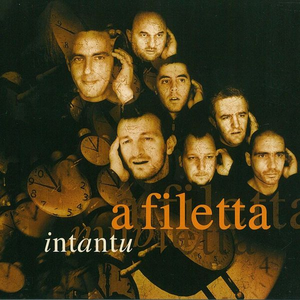Unlimited talent, a piercing vocal sensitivity and an overwhelming emotional fervor are
the trademarks of A Filetta magic. No one leaves their concerts unmoved.
No wonder that the filmmaker Bruno Coulais has called on A Filetta many times to produce music for his films. Beginning with Coulais’ Don Juan, the group has interpreted the scores for his “Himalaya”, which won a Disque d'or and a César in 2000 for the best film score, and the BO of Akhénaton’s film “Comme un aimant” and “Le Peuple Migrateur” by Jacques Perrin. 2003 album “SI DI MÈ” (Virgin). The awards : Diapason d’or, Choc de la music, Prix de l’Academie Charles Cros, Selection DJANGO D’OR 2003
The programs : INTANTU 6 voices, sacred and secular polyphonies and extracts from Bruno Coulais’s film musics - PASSIONE 6 voices sacred polyphonies (Holly Week) - SI DI MÈ 6 voices +musicians : songs. (Virgin)
For more information: www.tra-noi.eu For now only available in Dutch but in june also in English and French.
A Paghjella di l'impiccati
A Filetta Lyrics
Jump to: Overall Meaning ↴ Line by Line Meaning ↴
Ci viderete un cunventu
Di u tempu u tagliolu
Ùn ci n'hà sguassatu pientu
Eranu una sessantina
Chjosi in pettu à u spaventu
Dopu stati straziati
Parechji funu impiccati
Ci n'era unu zitellu
L'anu tuttu sfracillatu
E'di rota è di cultellu
Oghje chì hè oghje in Corscia
Fateci casu una cria
Si pate sempre l'angoscia
Intesu dì Marcu Maria
Era quessu lu so nome
Mancu quindeci anni avia.
The song "A Paghjella di l'impiccati" by A Filetta talks about a disturbing event that happened in Niolu, Corsica. The first verse talks about a convent that can be seen in Niolu. The next line says that the place hasn't shed any tears in the past. The next lines describe a group of around sixty people who were so afraid that they gathered together. In the second verse, there is a mention of some people who were tortured and butchered by executioners. Some of them were hanged, and among them was a young boy who was just fifteen. The last line urges people to remember this event and the name of the boy, Marcu Maria, who lost his life at such a young age.
The song paints a picture of a gruesome event that happened in Corsica, and it is a reminder of how cruel humans can be to each other. The convent in the song is a symbol of hope for the people, and their gathering shows how they came together in the face of adversity. The reference to Marcu Maria underscores the terrible tragedy of a young life lost. The song is a warning to people not to forget this dark period in Corsican history and that we must strive to create a world where such atrocities never occur again.
Line by Line Meaning
Sè vo ghjunghjite in Niolu
If you go up to Niolu
Ci viderete un cunventu
You will see a convent
Di u tempu u tagliolu
From ancient times it has been there
Ùn ci n'hà sguassatu pientu
It has not shed a tear
Eranu una sessantina
There were about sixty
Chjosi in pettu à u spaventu
Chosen to face fear
Dopu stati straziati
After being tortured
Da i boia o chì macellu
By the executioner or the butcher
Parechji funu impiccati
Many were hanged
Ci n'era unu zitellu
Among them was a young boy
L'anu tuttu sfracillatu
They were all broken
E'di rota è di cultellu
By the wheel and the knife
Oghje chì hè oghje in Corscia
Today as it is, in Corsica
Fateci casu una cria
Take heed of a warning
Si pate sempre l'angoscia
If anxiety always persists
Intesu dì Marcu Maria
Hear the words of Marcu Maria
Era quessu lu so nome
That was his name
Mancu quindeci anni avia.
He was not even fifteen years old.
Contributed by Evan V. Suggest a correction in the comments below.

Dee-Jai Janevski
on L'attesa
Album: Si di mè
10. L'Attesa
Una ripa di terra in core pè l'eternu
E'stu surrisu caru voltu versi l'avvene
Un passu chì andarà senza più malapena
E'l'ochji abbagliulati nantu à u mare paternu
Quant'hè strana l'attesa
Una squatra di fiure più nere ch'è u dolu
Un avvampu di focu chì affoga u rispiru
Tuttu ciò chì si more seza oncia di rigiru
Ogni cennu di vita chì varca u celu novu
Quant'hè strana l'attesa
Un sonniu malandatu chì chjama u terrore
L'ingannu è u vituperiu in tresca pè e cime
U ricordu annannatu da le to ore patime
E'u to celu chì piglia u versu di u chjarore
Quant'hè strana l'attesa
Una ripa di terra è un branu di sole
A vistica di ciò chì sbramò l'infelice
Quand'eiu ne rimiru a mio terra à l'arice
Di iss'ombra meia nata quandi à ella s'annoda
Quant'hè dolce l'attesa di tè
10. L’ATTENTE
Un arpent de ta terre en mon coeur pour toujours
Ainsi que ce sourire rivé aux lendemains
Ce pas qui s'en ira sans jamais plus faiblir
Ces yeux qu'auront grisés ces ondes originelles
Combien est étrange l'attente
Tout un fatras d’images que noircissent des deuils
Une étreinte de flammes qui mutile le souffle
Ce qui va à sa perte comme on va à tâtons
Et chaque frémissement qui remplit le ciel vierge
Combien est étrange l'attente
Des songes dévoyés épuisés de terreur
La tromperie, l'outrage triomphant à leurs faîtes
Un souvenir bercé par des heures tranquilles
Sous un ciel apaisé qui sans fin s'éclaircit
Combien est étrange l'attente
Un arpent de ta terre comme un éclat de soleil
Une trace vibrante pour soulager l'espoir
Ce que je sais de toi mon pays, ma demeure
Qui se confond sans trêve à mon ombre fébrile
Combien douce est l'attente que je nourris de toi
Natalie Nata Swan
on Ghmerto
უფრო ქართული, დახვეწილად ქართული, ცამდე ამაღლებული ქართულ ტაძრებშიც კი (გარკვეული გამონაკლისების გარდა) არ მომისმენია, არ შეიძლება უკვლეველი დარჩეს ეს მისტიკური სიახლოვე. მადლობა კორსიკულ ხმებს.